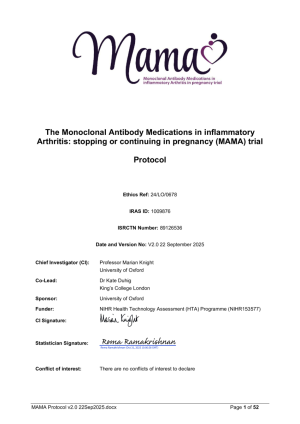Information for Health Professionals
Background
Autoimmune inflammatory arthritides (AIA) are devastating, potentially joint destroying conditions, affecting 1-2% of people. AIA includes rheumatoid arthritis (RA), psoriatic arthritis (PsA), axial spondyloarthritis (AxSpA) and juvenile idiopathic arthritis (JIA). These AIA collectively affect many women during their reproductive years. Many women with these chronic conditions wish to plan pregnancy and it is known that poor control of AIA itself is associated with adverse pregnancy outcomes.
Disease-modifying anti-rheumatic drugs (DMARDs) are medications which treat AIA conditions, and work by reducing inflammation and improving symptoms such as pain and stiffness. Biologic DMARDS (bDMARDs) are a newer group of medical therapies, also known as 'biologics'. These medications are often extremely effective, and have brought about disease control previously unachievable through conventional DMARDs alone.
Despite the good fetal safety profile of these medications, it still remains uncertain whether biologics should be continued throughout the entire pregnancy. Historically, guidelines have been cautious and have recommended that women stop these drugs prior to the third trimester (week 28 of gestation). However, there is a paucity of evidence on the impact of stopping biologics on disease control and pregnancy outcomes, which runs the risk of AIA disease flare.
The 2022 British Society of Rheumatology guidelines state that that biologics may be continued throughout pregnancy if required to control active/severe disease. Despite the updated 2022 national guidelines, there remains wide variation in practice across the UK regarding the use of biologics around the time of pregnancy and conception.
Trial Aim
This trial aims to fill the gap in evidence and enable evaluation of arthritis disease activity, pregnancy and infant outcomes in women randomly allocated to continuing their biologic medication throughout pregnancy, or to stopping their biologic medication prior to 28 completed weeks' gestation.
Trial Design
The MAMA trial is a phase III, multicentre, pragmatic, two-arm, parallel-group, unblinded randomised controlled trial, with an internal pilot and an integrated health economic analysis.
Pregnant women less than 28 completed weeks of gestation prescribed a biologic for Autoimmune Inflammatory Arthritis and who meet the eligibility criteria for the MAMA trial will be allocated at random to one of the following groups:
The continuing group. Women in this group will continue taking their biologic thoughout pregnancy.
OR
The stopping group. Women in this group will stop their biologics before the third trimester (28 weeks) of pregnancy, and restart no earlier that 2 weeks post-pregnancy.
Other than stopping or continuing your current biologic by 28 weeks gestation no other changes will be made to your arthritis treatment as a result of being in this study.
We aim to recruit 328 women (164 per trial arm) in approximately 35 obstetric units with a maternal medicine service in the UK.
The planned recruitment period for the MAMA trial is 48 months, including a 12-month internal pilot, planned for 01/09/2024 to 31/08/2028
Inclusion Criteria
Pregnant women with Autoimmune Inflammatory Arthritis (AIA), satisfying the following criteria:
- Have a diagnosis of rheumatoid arthritis (RA), juvenile idiopathic arthritis (JIA), psoriatic arthritis (PsA) or axial spondyloarthritis (axSpA)
- Pregnant at less than 28 completed weeks' gestation
- Prescribed a regularly dosed biologic disease-modifying anti-rheumatic drug (bDMARD) (including biologic originators and biosimilars) for RA, JIA, PsA or axSpA
- Aged 16 years or over
- Has provided informed consent
(See protocol for full list of bDMARDs)
Exclusion Criteria
- Prescribed rituximab either during pregnancy or in the 6 months prior to conception
- Prescribed JAK inhibitors
- Contraindication to cessation of bDMARDs (e.g. active, sight-threatening uveitis)
- Current, active tuberculosis in the immediate or close family or household members
- Plans to move in the first 6 months after birth with their baby to live in a country with a high rate of tuberculosis (incidence >40 per 100,000 population)



